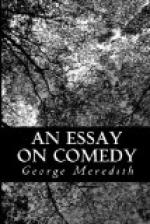Double Dealer. {6} His Way of the World might be
called The Conquest of a Town Coquette, and Millamant
is a perfect portrait of a coquette, both in her resistance
to Mirabel and the manner of her surrender, and also
in her tongue. The wit here is not so salient
as in certain passages of Love for Love, where Valentine
feigns madness or retorts on his father, or Mrs. Frail
rejoices in the harmlessness of wounds to a woman’s
virtue, if she ‘keeps them from air.’
In The Way of the World, it appears less prepared
in the smartness, and is more diffused in the more
characteristic style of the speakers. Here,
however, as elsewhere, his famous wit is like a bully-fencer,
not ashamed to lay traps for its exhibition, transparently
petulant for the train between certain ordinary words
and the powder-magazine of the improprieties to be
fired. Contrast the wit of Congreve with Moliere’s.
That of the first is a Toledo blade, sharp, and wonderfully
supple for steel; cast for duelling, restless in the
scabbard, being so pretty when out of it. To
shine, it must have an adversary. Moliere’s
wit is like a running brook, with innumerable fresh
lights on it at every turn of the wood through which
its business is to find a way. It does not run
in search of obstructions, to be noisy over them;
but when dead leaves and viler substances are heaped
along the course, its natural song is heightened.
Without effort, and with no dazzling flashes of achievement,
it is full of healing, the wit of good breeding, the
wit of wisdom.
‘Genuine humour and true wit,’ says Landor,
{7} ’require a sound and capacious mind, which
is always a grave one. Rabelais and La Fontaine
are recorded by their countrymen to have been reveurs.
Few men have been graver than Pascal. Few men
have been wittier.’
To apply the citation of so great a brain as Pascal’s
to our countryman would be unfair. Congreve
had a certain soundness of mind; of capacity, in the
sense intended by Landor, he had little. Judging
him by his wit, he performed some happy thrusts, and
taking it for genuine, it is a surface wit, neither
rising from a depth nor flowing from a spring.
‘On voit qu’il se travaille
a dire de bons mots.’
He drives the poor hack word, ‘fool,’
as cruelly to the market for wit as any of his competitors.
Here is an example, that has been held up for eulogy:
Witwoud: He has brought
me a letter from the fool my brother, etc.
etc.
Mirabel: A fool, and your
brother, Witwoud?
Witwoud: Ay, ay, my half-brother.
My half-brother he is; no nearer,
upon my honour.
Mirabel: Then ’tis
possible he may be but half a fool.
By evident preparation. This is a sort of wit
one remembers to have heard at school, of a brilliant
outsider; perhaps to have been guilty of oneself,
a trifle later. It was, no doubt, a blaze of
intellectual fireworks to the bumpkin squire, who
came to London to go to the theatre and learn manners.




